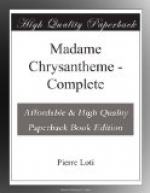This portico and the monster are the two great overwhelming masses in the foreground of the incredible scene before us; they stand out with dazzling boldness against the vague and ashy blue of the distant sphere beyond; behind them, Nagasaki is spread out in a bird’s-eye view, faintly outlined in the transparent darkness with myriads of little colored lights, and the extravagantly dented profile of the mountains is delineated on the starlit sky, blue upon blue, transparency upon transparency. A corner of the harbor also is visible, far up, undefined, like a lake lost in clouds the water, faintly illumined by a ray of moonlight, making it shine like a sheet of silver.
Around us the long crystal trumpets keep up their gobble. Groups of polite and frivolous persons pass and repass like fantastic shadows: childish bands of small-eyed mousmes with smile so candidly meaningless and coiffures shining through their bright silver flowers; ugly men waving at the end of long branches their eternal lanterns shaped like birds, gods, or insects.
Behind us, in the illuminated and wide-open temple, the bonzes sit, immovable embodiments of doctrine, in the glittering sanctuary inhabited by divinities, chimeras, and symbols. The crowd, monotonously droning its mingled prayers and laughter, presses around them, sowing its alms broadcast; with a continuous jingle, the money rolls on the ground into the precincts reserved to the priests, where the white mats entirely f disappear under the mass of many-sized coins accumulated there as if after a deluge of silver and bronze.
We, however, feel thoroughly at sea in the midst of this festivity; we look on, we laugh like the rest, we make foolish and senseless remarks in a language insufficiently learned, which this evening, I know not why, we can hardly understand. Notwithstanding the night breeze, we find it very hot under our awning, and we absorb quantities of odd-looking water-ices, served in cups, which taste like scented frost, or rather like flowers steeped in snow. Our mousmes order for themselves great bowls of candied beans mixed with hail—real hailstones, such as we might pick up after a hailstorm in March.
Glou! glou! glou! the crystal trumpets slowly repeat their notes, the powerful sonority of which has a labored and smothered sound, as if they came from under water; they mingle with the jingling of rattles and the noise of castanets. We have also the impression of being carried away in the irresistible swing of this incomprehensible gayety, composed, in proportions we can hardly measure, of elements mystic, puerile, and even ghastly. A sort of religious terror is diffused by the hidden idols divined in the temple behind us; by the mumbled prayers, confusedly heard; above all, by the horrible heads in lacquered wood, representing foxes, which, as they pass, hide human faces—hideous livid masks.
In the gardens and outbuildings of the temple the most inconceivable mountebanks have taken up their quarters, their black streamers, painted with white letters, looking like funeral trappings as they float in the wind from the tops of their tall flagstaffs. Thither we turn our steps, as soon as our mousmes have ended their orisons and bestowed their alms.




